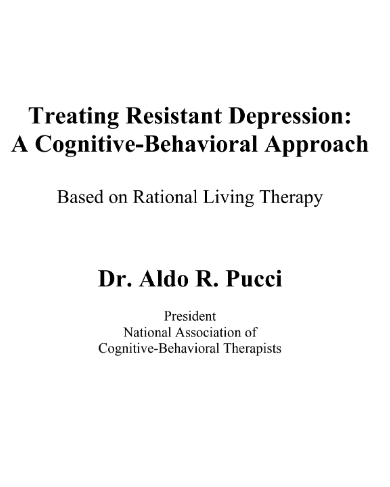NACBT-OneDay
Treating Resistant Depression Home Study Program
Treating Resistant Depression Home Study Program
Couldn't load pickup availability
Share
Description
Using Cognitive-Behavioral Therapy to Treat Resistant Depression
Recorded from a "live" seminar. The audio presentation portion is provided on a USB thumb drive.
Depressed clients often pose a great challenge to mental health professionals. The intensity of the client's distress often is so significant that desperate professionals think they must resort to more desperate "treatment" methods, such as electroconvulsive therapy or antipsychotic medication. The client appears to have no goals, no ambition to achieve goals, or no hope of achieving them. The depressed client's thinking tends to be very pervasive and very stubborn, leaving the mental health professional quite pessimistic that a successful outcome will be achieved. And if that were not bad enough, there is always the possibility that the client might commit suicide, and that fact lingers in the professional's mind.
The first thing that will become apparent from this seminar is that Dr. Pucci is not interested in helping people to feel better, but rather to get better. This seminar will teach you how to more accurately distinguish between "learned" and "not-learned" depression. Because depressive symptoms sometimes are the result of physiological problems, you will learn "natural" approaches to their treatment. This seminar will teach you how to overcome your own problems in working with depressed clients. You will learn how to engage clients with goals that matter to them and how to help clients develop an accurate assessment of their ability to achieve those goals. You will also learn how to help depressed clients correct their most stubborn depression-inducing thoughts, and how to overcome their resistance to do so. This seminar will give you a unique and powerful method to overcome hopelessness, thus correcting clients' suicidal ideation.
* •Help your clients not just feel better, but get better
* •Correct the most resistant hopeless thinking
* •Overcome suicidal ideation and stubborn low self-esteem
* •Surmount the most stubborn resistance to change
* •Discover how to help your clients overcome the "depression identity"
* •Examine natural approaches to the treatment of depressive symptoms
* •Discuss the necessity of counseling yourself first when treating depressed clients
* •Outline how to use Cognitive-Behavioral Therapy to treat resistant depression
* •Identify how to combat the most resistant thinking
* •Discuss how to subdue therapeutic resistance ©
Copyright, 2009 by Aldo R. Pucci. All Rights Reserved.

